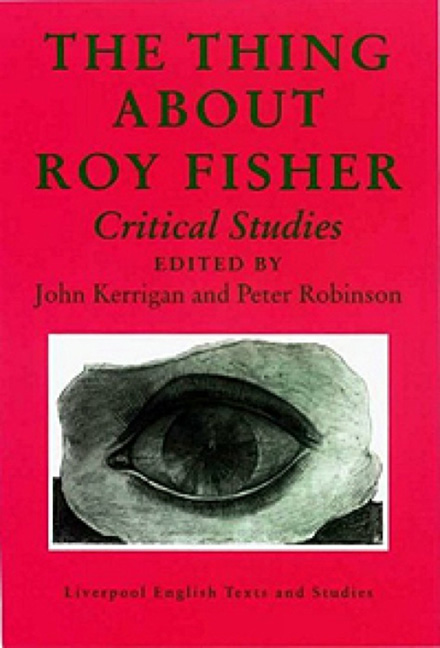Book contents
- Frontmatter
- Contents
- Notes on Contributors
- Acknowledgements
- Abbreviations
- Introduction
- 1 Roy Fisher on Location
- 2 ‘Menacing Works in my Isolation’: Early Pieces
- 3 TheWork of a Left-Handed Man
- 4 Osmotic Investigations and Mutant Poems: An Americanist Poetic
- 5 ‘Making Forms with Remarks’: The Prose
- 6 Cutting-Edge Poetics: Roy Fisher's ‘Language Book’
- 7 A Burning Monochrome: Fisher's Block
- 8 ‘The Secret Laugh of the World’
- 9 ‘Exhibiting Unpreparedness’: Self, World, and Poetry
- 10 ‘Coming into their Own’: Roy Fisher and John Cowper Powys
- 11 A Furnace and the Life of the Dead
- 12 Last Things
- Roy Fisher: A Bibliography
- Indexes
Introduction
- Frontmatter
- Contents
- Notes on Contributors
- Acknowledgements
- Abbreviations
- Introduction
- 1 Roy Fisher on Location
- 2 ‘Menacing Works in my Isolation’: Early Pieces
- 3 TheWork of a Left-Handed Man
- 4 Osmotic Investigations and Mutant Poems: An Americanist Poetic
- 5 ‘Making Forms with Remarks’: The Prose
- 6 Cutting-Edge Poetics: Roy Fisher's ‘Language Book’
- 7 A Burning Monochrome: Fisher's Block
- 8 ‘The Secret Laugh of the World’
- 9 ‘Exhibiting Unpreparedness’: Self, World, and Poetry
- 10 ‘Coming into their Own’: Roy Fisher and John Cowper Powys
- 11 A Furnace and the Life of the Dead
- 12 Last Things
- Roy Fisher: A Bibliography
- Indexes
Summary
Roy Fisher's ‘The Making of the Book’ begins with this quoted advice: ‘ Let the Blurb be strong, /modest, and true.’ The reason given for this policy is firmly defensive: ‘ Build it to take a belting; / they'll pick on that.’ It has become the practice now to place alongside the blurb on poetry books some plea-bargaining quotations from earlier reviews, and, in Fisher's case, lines exerpted froma piece by JohnAsh seem the poet's and his publishers'choice, for they appear on the back of his three most recent gatherings of poems: ‘ In a better world, he would be as widely known and highly praised as Seamus Heaney and Ted Hughes …’ This is a sentence that could, as Fisher's poem has it, ‘ take a belting’, and from a number of angles.The first might be that while the late Poet Laureate is undoubtedly more widely known than Fisher, his work is not as consistently praised, though it is true that Hughes's status means that he has attracted more than the advocacy or silence reserved for the less prominent. Secondly, though the Nobel prize winner is both more highly praised and more widely known, Fisher could not be described as having anything like an over-pitched reputation that stands in need of considered correction, a situation that may have arisen for Heaney'swork, and one not within the poet's control. Finally, it is by no means clear where or what such a ‘ better world’ might be, and, while the aim of the critical studies gathered here is to make Fisher's work more widely known in this world, among the many virtues of his poems engaged in transforming the perception and understanding of life is their having little time for wholly imaginary, alternative places.
Our title, The Thing about Roy Fisher, alludes to one of the poet's more unusual works. As Derek Slade's invaluable chronology (published here for the first time) tells us, ‘ The Thing about Joe Sullivan’ was written over three days at the end of July 1965. Despite its eventual appearance as the title poem of a 1978 collection, this 62-line homage remained unpublished for over six years. Fisher may have been prompted to let it see the light of day in September 1971 by the death of its subject, the jazz pianist Joe Sullivan (1906—1971).
- Type
- Chapter
- Information
- The Thing About Roy FisherCritical Studies, pp. 1 - 15Publisher: Liverpool University PressPrint publication year: 2000



